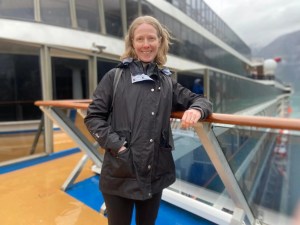Sleep Science Offers Another Excuse To Cruise

Introduction
Looking for an excuse to book another cruise? Or trying to convince a reluctant cruiser to give it a shot? The answers may be: “I have to do it for science!” or “According to science, you’ll never sleep better!” Which brings us to today’s topic, inspired by my friends at Panache Cruises (specializing in luxury and expedition cruising): The science of cruise sleep.
The Science of Cruise Sleep
I’ve always argued that I never sleep better than on a cruise. And now there’s science to back that up! Travel experts at Panache Cruises consulted sleep experts and collected the latest research related to sleeping and recovering from jet lag on a cruise. Here are some of their key findings:
- Exposure to sea air can improve blood oxygen levels, boost vitamin D, and improve breathing leading to higher-quality sleep. Experts recommend 24-hour exposure to sea air for maximum benefit, particularly during the night-time hours while sleeping.
- Landlubbers staying in beachside hotels will get the benefits of an onshore sea wind during the day, but not at night when the air will be blowing from the land out to sea.
- Studies have shown that sea air can help you gain dozens of minutes of sleep per night with a walk in sea air resulting in an average of 47 more minutes of sleep compared with just 12 minutes more for a walk inland.
- Getting outside in the sea air can increase concentration, remind tired bodies to stay awake and give respiratory systems a much-needed boost of oxygen after a long flight.
In addition to breathing in sea air, sleep experts also advocate bright light to help shift our circadian rhythm, with the deck of a cruise ship being a natural place to maximize exposure. Dr. Lindsay Browning, a sleep expert at Trouble Sleeping says that getting bright light exposure at the right time after a long-haul flight is one of the most powerful things we can do to boost and help shift our circadian rhythm. She said: “As a general rule, you want to get lots of bright light exposure during the daytime and avoid light at night. When traveling on a cruise ship, you will naturally get a lot of bright light exposure during the day, helping your circadian rhythm. Further, when traveling by ship, you will have a bedroom cabin with proper bed and curtains, enabling you to sleep at night when you want to.”

Dr. Browning also notes that one of the best ways to beat jet lag is to not fly at all and take a ship from your home country meaning you won’t cross time zones as quickly and the effects of jet lag will be reduced. She said: “When traveling long distances by boat or ship, you are unlikely to cross more than one timezone per day, naturally lessening the effect of jet lag as the time onboard will shift gradually through the journey. In contrast, when flying you will experience the full time change in a short space of time.”
Cruising also offers vacationers other jet lag-busting benefits beyond exposure to sea air and natural light:
- Flexible eating options onboard and access to fresh melatonin-rich foods such as melon or berries can help regulate sleep habits.
- Access to exercise on deck or in one of the onboard gyms can be beneficial in managing circadian rhythms.
- Cruises allow jet-lagged travelers to rest and recuperate, providing plenty of opportunity to catch up on sleep or be pampered in one of the onboard spas.
James Cole, Founder of Panache Cruises is no stranger to long-haul travel and recommends getting as much sea air as possible in the first few days to keep jet lag at bay. He said: “Jet lag doesn’t have to ruin your vacation plans, leaving you feeling sleepy and unable to concentrate fully on the experiences you have been so looking forward to. Reduced cabin pressure and lower-than-normal oxygen levels on airplanes can leave passengers feeling sleepy and dehydrated, particularly during a long-haul flight. To counteract the sudden shift in time zones and reset the circadian rhythm, travelers should aim to give their bodies the oxygen, light and nutrients they need. Heading straight to a cruise ship from the airport will give vacationers the best chance to recover from jet lag quickly so they can get on with enjoying their holiday. The research suggests that breathing in as much of the ionized sea air during the first few nights will help vacationers beat jet lag quicker than land-based holidays. Cruises with a day or two at sea at the start of the holiday will also give travelers a chance to get some exercise in a gym, relax in a spa, and eat what they need when they need it. The time we have on holiday is precious, so if traveling long-haul, choosing a holiday that helps counteract jet lag will allow you to make the most of the time you have.”
With a special thanks to Panache Cruises for offering us all another excuse to book a cruise…
Class Dismissed!
Homework (10 points): Share your cruise sleeping experiences and tips to the comments.
Also, subscribe to the blog to receive new Cruising 101 content direct to your e-mail (scroll up to the top right if on a computer or keep scrolling down if on a mobile device) and follow Prof. Cruise on your favorite social media sites:
Twitter (@cruiseprof)
Instagram (@profcruise)
TikTok (profcruise)














Great article. That’s why I slept later than usual this AN on the NCL Getaway. So it’s not The 30 or 40 drinks most passengers have the first night out?
LOL! I hope these studies controlled for that!